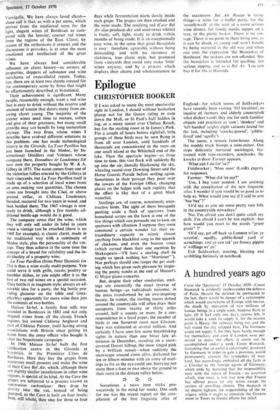Epilogue
CHRISTOPHER BOOKER
If I was asked to name the most spectacular sight in London, I should without hesitation plump not for the Queen riding in state down the Mall, or St Paul's half hidden in fog, or a misty sunset over Chelsea Reach, but for the starling roost in St James's Park. For a couple of hours before nightfall, little groups of these birds may be seen flying in from all over London, until hundreds of thousands are concentrated in the trees on one small island at the Whitehall end of the lake. Then the spectacle begins—as from time to time, this vast flock will suddenly fly up into the air, literally blackening the sky, wheeling round over Downing Street and the Horse Guards Parade before settling again. Sometimes in their passage they pour over the towers of the Foreign Office, changing places on the ledges with such rapidity that the effect is like that of a great black waterfall.
Starlings are, of course, notoriously unat- tractive birds. The sight of them brusquely pushing aside a flock of sparrows from household scraps on the lawn is one of the few things which can persuade me to look on sparrows with affection. I suppose they must command a certain wonder for their ex- traordinary capacity to mimic almost anything from blackbird song to the squawk of chickens, and even the human voice (which earned them their one mention by Shakespeare—T11 have a starling shall be taught to speak nothing but "Mortimer" '). Nor perhaps should one forget the pet starl- ing which has given such pleasure by inspir- ing the pretty rondo at the end of Mozart's G Major piano concerto.
But, despite their other similarities, starl- ings are essentially the exact reverse of human beings—as individuals noisome, in the mass transformed by an awe-inspiring beauty. In winter, the starling roosts dotted around the countryside will often draw their occupants from twenty or thirty miles around, half a county or more. In a cor- respondence in a local paper, the number of birds at one Somerset roost near Glaston- bury was estimated at several million. And certainly I have seen few more breathtaking sights in nature than one bitter late af- ternoon in December, standing on a snow- covered Dorset hilltop, the snow tinged pink by a brilliant sunset—when suddenly the snowscape around came alive, darkened for ten or fifteen minutes with an army of starl- ings as far as the eye could see, hurrying not more than a foot or two above the ground to their roost in the distant valley below.
* * * Sometimes a news item sticks pro- vocatively in the mind for weeks. One such for me was the recent report on the com- pilation of the first linguistic atlas of England—for which teams of fieldworkers have recently been visiting '313 localities', to inquire of farmers and elderly countryfolk what dialect words they use for such familiar objects and practices as 'cow', 'donkey' and left-handed' (eighty-eight variants found for the last, including 'coochy-pawed', 'gibble- fisted' and 'squiffy').
The scene, a remote farm-house. Along the muddy track bumps a mini-minor. Out steps delicately nurtured sociologist, fes- tooned with tape-recorders, notebooks. He knocks at door. Farmer appears.
'What can I do for 'ee?'
Fieldworker: 'Moo moo' (Looks eagerly for response).
Farmer: 'What did 'ee say?'
'Um, I beg your pardon. I am assisting with the compilation of the new linguistic atlas. I wonder if you would be so good as to help us. What would you say if I said to you "baa baa"?'
'Oi'd say as you see some pretty rum folk in the countryside nowadays.'
'No, I'm afraid you don't quite catch my drift. I'm afraid I can't be too explicit—but how would you react to the words "grunt grunt" ?'
'Oi'd say, get off back to Lunnon wi'ye, ye scrattin', squiffy, gibble-fisted yard o' scritchings. and ye can tak' yer francy pippin o' wifflings wi' ye.'
Exit fieldworker, mooing, bleating and scribbling furiously in notebook.






































 Previous page
Previous page